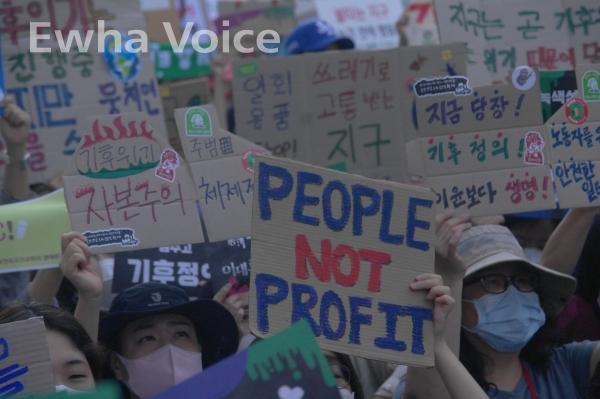
“We, the frontliners of the climate crisis, proclaim that we will step forward as the agents of climate justice,” states the 924 Climate March Proclamation. “We cannot and will not continue to live under this unequal, threatening, and violent system.”
On Sept. 24, over 35,000 people gathered in the Gwanghwamun area from all over the country to call for climate justice. With over 400 organizations in solidarity for a common cause, the Climate Justice March was one of the largest organized marches for climate action in Korea.
There was a greater emphasis on amplifying the voices of those on the frontlines of climate change and calling for systemic change. With shouts of anger and dances of hopeful joy, the march was filled with active solidarity and calls for inclusivity.
The call for climate justice is not a recent phenomenon. The environmental justice movement gained traction in the 1980s with communities of color in the United States battling the disproportionate environmental impacts on low-income people of color. The movement has broadened, bringing it to Seoul in the present day. Ewha Voice reached out to a few grassroots activists on the frontlines.
Lee Ho-rim is a standing activist for the organization Solidarity for LGBT Human Rights in Korea, also known as Haengsungin. Established in 1997, the organization seeks to secure the rights and dignity of sexual minorities through resistance and solidarity.
Lee believes that the climate crisis is not simply an issue of carbon emissions but a problem stemming from the capitalist system that also perpetrates social inequality and discrimination. In this sense, she says that the interests of the LGBTQ community and climate crisis movement are closely intertwined.
This is not the only reason why Lee sees the need for a larger platform for social minorities. With this summer’s heavy rain, there was a tendency for media reports to sensationalize certain living conditions. Lee believes that social minorities should have a platform where they not only speak about their vulnerability but also become the voice for change.
In response, activists are pointing to changing the system as the solution to combatting climate change. Lee believes that this does not have to be intimidating.
“When I think of what individuals can do about the climate crisis, it is not about thinking of what to or what not to buy as a consumer,” she said. “I think it starts with joining in the expression of a political voice and working together to create a bigger voice.”
Kim Ki-hun is a Korean teacher at Chupungryeong Middle School. He also organizes climate justice projects and advocates for ecological transition education as a member of the Special Committee on Climate Crisis Response of the Korean Teachers and Education Workers Union (KTU) Chungbuk branch. Kim even organizes community projects that promote animal rights and veganism at a local vegan bakery and café in Daegu.
Recently, the government decided to retract recent developments towards adding ecological transition education to the national curriculum. Despite this, there have been active efforts to steer environmental education away from simply emphasizing carbon neutrality and individual efforts. Educators have been at the forefront of intersecting diverse topics such as human rights, democracy, and biodiversity into their climate education.
Much of Kim’s time is spent reconstructing curriculums to connect them to climate justice and currently teaches classes such as permaculture farming or climate action project-based classes. Kim makes a conscious effort to design classes that expose students to various experiences while being complex and sustainable.
“School is a unique space. It is both repressive and transformative,” Kim said.
Kim recognizes that the education system is difficult to change. Yet, he also firmly believes that students who received education that help them recognize the threats of the climate crisis are much more empowered in responding and adapting to the crisis as well. He hopes that people will continue to support the teachers in this cause.
However, even activists are aware that fighting for change can be taxing on the mind and body. Known as climate depression, people can feel helpless facing such a large issue that seems out of their control.
“I also think it is nearly impossible to live in this society without feeling helpless at some point,” Lee said.
She believes that it is more important than ever for people to connect with people with the same cause and to realize that they are, in her words, “not an isolated individual, but part of many people who are demanding change.”
Kim shared his favorite quote from Jeong Se-rang’s essay “You can’t love Earth as much as people on Earth.”
“Even if the world is being destroyed at a frightening speed, I try not to forget that the people trying to fix it are also not stopping.”

